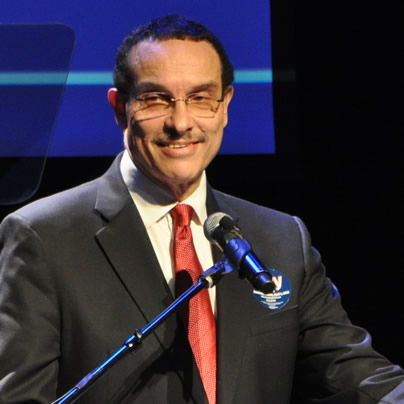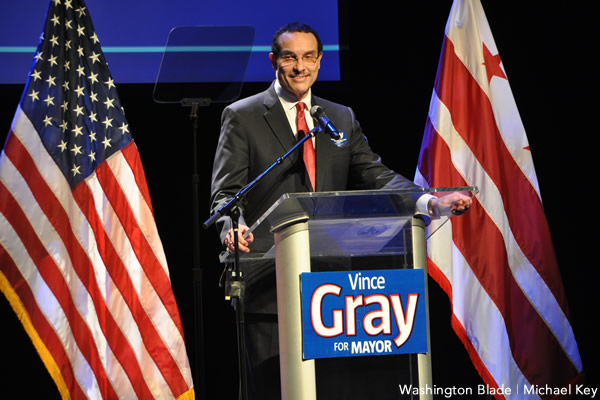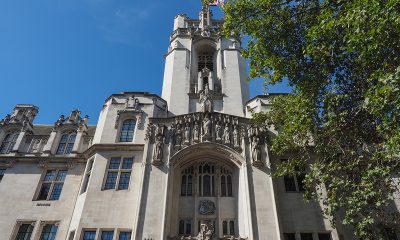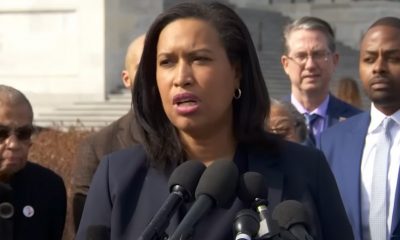Local
Gray, Mendelson receive top GLAA ratings for April primary
Graham outscores opponent in Ward 1 Council race

Gray and Mendelson, who are longtime supporters of the LGBT community, were the only two candidates to receive a +10 among a total of 43 candidates rated in contests for mayor and seats on the City Council.
Council members Tommy Wells (D-Ward 6) and Jack Evans (D-Ward 2), who are running for mayor, came in close behind Gray with ratings of +9.5 and +8 respectively. Both have also been longtime supporters of the LGBT community.
GLAA is a non-partisan LGBT advocacy group founded in 1971. It says it rates candidates on the basis of their past records on LGBT, AIDS and other issues deemed important to the LGBT community and on their responses to a detailed questionnaire that asks about those issues.
The group has said it gives higher ratings to candidates that go beyond just expressing support on LGBT issues when they show through their questionnaire responses an understanding of the issues and how best to address them.
GLAA President Rick Rosendall called the LGBT related records of Wells and Evans “excellent” and noted that the group said in its statement that Evans has the longest record of support due to his 20-year tenure as a Council member. He said Gray and Mendelson received a +10 score because both had undertaken a large number of pro-LGBT initiatives in the last few years that, along with their strong past records, gave them an edge over the other candidates.
“Mr. Gray’s accessibility, responsiveness, and follow-through have made him highly effective on LGBT issues,” GLAA said in its statement. “He has been a champion for transgender people, including with Project Empowerment job training.”
Among the other mayoral candidates running in the April primary, Busboys and Poets restaurant owner and progressive political activist Andy Shallal received a +6; Council member Muriel Bowser (D-Ward 4) received a +5.5; attorney and former State Department official Reta Jo Lewis received a +4.5, Council member Vincent Orange (D-At-Large) received a +3; and businessman and civic activist Carlos Allen received a “0” rating.
In its statement accompanying the ratings, GLAA said Allen received an automatic score of “0” under the group’s policy for candidates who don’t return the questionnaire and have no known record on LGBT issues.
All of the Democratic mayoral candidates that returned the questionnaire expressed strong support for LGBT rights in general.
Among the non-Democratic mayoral candidates, GLAA gave Statehood-Green Party candidate Faith a +3.5 and gay Libertarian Party candidate Bruce Majors a +2.
Majors, a longtime LGBT rights advocate, received a +2 rating because “his party’s ideological distrust of government is at odds with policies and reforms favored by GLAA,” the group said in its statement. “Consequently, many of his responses were interpreted as non-responsive or negative,” the statement says.
Gay D.C. Council member Jim Graham (D-Ward 1) received a +7.5 compared to his sole opponent in the Democratic primary, public relations executive and community activist Brianne Nadeau, who received a +5.
Political observers say Graham is facing his toughest re-election race this year for a fifth term on the Council
GLAA said it gave Graham higher points for his long record of support on LGBT and AIDS related issues, citing his work recently on pushing through a bill to provide better services to homeless LGBT youth. The group gave him a slight edge over Nadeau in the substance of his questionnaire responses.
But the group gave Nadeau a slight edge over Graham over the two candidates’ positions on an issue GLAA has long considered important – whether tiny, ad hoc neighborhood citizens groups should be given legal standing to protest liquor licenses of restaurants and bars.
GLAA favors giving exclusive authority to challenge liquor licenses to the city’s elected Advisory Neighborhood Commissions rather than un-elected ad hoc groups, which nightlife advocates say unnecessarily block or delay the approval of licenses for nightlife establishments, both gay and straight. Nadeau, a former ANC commissioner, said she supports giving ANCs the sole legal standing to contest liquor licenses.
GLAA said Graham didn’t take a position on the issue in his questionnaire response, saying he described instead how he helped facilitate a committee of citizens and businesses representatives to consider the issue.
In the Council Chair race, GLAA said Mendelson’s +10 rating reflects his record as an ally who has shepherded through the Council a long list of LGBT supportive bills, including the marriage equality bill.
The group said it gave Mendelson’s opponent, Democrat Calvin Gurley, a “0” rating because Gurley didn’t return the questionnaire and also has no known record on LGBT issues.
Among the five Democrats running in the At-Large Council race, challenger Nate Bennett-Fleming, who currently serves as the city’s non-paid “shadow” U.S. Representatives, received a +7, one point higher than the +6 rating GLAA gave to incumbent Council member Anita Bonds, who won the seat in a special election last year.
Both are strong supporters of LGBT rights. But the slightly higher rating for Bennett-Fleming, a recent law school graduate relatively new to the local political scene compared to Bonds, who has been active in politics and government since the 1970s, is likely to raise eyebrows among some local activists.
GLAA President Rick Rosendall said Bennett-Fleming’s questionnaire responses included a few more substantive insights than Bonds’ but called both candidates’ responses “very good,” saying GLAA considers a rating of +5 and above to be a good showing for a candidate.
The ratings for the other At-Large Democratic candidates were: Pedro Rubio, +3; John Settles II, +2.5; and Kevin Valentine Jr., 0. Valentine is among the candidates who didn’t return the questionnaire and have no known LGBT record, GLAA said.
Among the non-Democratic At-Large candidates running in their respective party primaries, Statehood-Green Party candidate Eugene Puryear received a 4.5; Statehood-Green Party candidate G. Lee Aikin received a +3; and Libertarian Party candidate Frederick Stein, who didn’t return the questionnaire, received a “0.”
Gay Republican candidate Marc Morgan, who’s running unopposed for the GOP nomination for the At-Large Council seat, received a +2. GLAA said he didn’t return the questionnaire.
In its statement accompanying the ratings, GLAA said Morgan’s record of involvement in LGBT rights activities in Ohio and Arizona and his involvement with the National Minority AIDS Council in D.C. were counted in his favor and viewed as “very admirable.”
The statement says Morgan lost points for “his support for anti-gay politicians John Boehner, Robert Ehrlich, and Laura Knapereck,” which “detract from his record.” Boehner, a Republican and Speaker of the U.S. House, among other things, has blocked the Employment Non-Discrimination Act, or ENDA, an LGBT rights bill, from coming up for a vote in the House. Ehrlich is a former Maryland governor and Knapereck has served in the Arizona legislature.
In the remaining Council races, GLAA issued these ratings:
Ward 3: Council member Mary Cheh (D), +8.5; Ryan Sabot (Libertarian), “0” [Questionnaire wasn’t returned].
Ward 5: Council member Kenyan McDuffie (D), +4.5; Kathy Henderson (D), “0” [Questionnaire was returned but GLAA disagreed with most responses]; Carolyn Steptoe (D), -2.
GLAA said Steptoe didn’t return the questionnaire and is viewed as having a negative record for testifying in support of placing D.C.’s same-sex marriage law on the ballot in a voter referendum in 2010.
Ward 6: Charles Allen (D), +8.5; Darrel Thompson (D), +2; Pranav Badhwar (Libertarian), +2.
Allen, the former chief of staff for Wells, received the highest rating for a non-incumbent running in the primary. In its statement, GLAA said Allen has a long record of support for LGBT issues both as a former Council staffer and former president of the Ward 6 Democrats.
GLAA’s detailed analysis of its ratings, including links to the candidates’ questionnaire responses, can be found here: http://www.glaa.org/archive/2014/primaryratings.shtml
District of Columbia
Two charged with assaulting, robbing gay man at D.C. CVS store
Incident occurred after suspects, victim ‘exchanged words’ at bar

D.C. police just after 1 a.m. on April 10 arrested two men for allegedly assaulting and robbing a gay man inside a CVS store at 1418 P St., N.W., according to a police report and charging documents filed in D.C. Superior Court.
The charging documents state that the alleged assault and robbery occurred a short time after the three men “exchanged words” at the gay bar Number 9, which is located across the street from the CVS.
The arrested men are identified in the charging documents as Marquel Jose Diaz, 27, of Northwest D.C., and Lorenzo Jesse Scafidi, 21, of Elizabeth City, N.C. An affidavit in support of the arrest for Diaz says Diaz and the victim “were previously in a relationship for a year.”
Court records show Diaz was charged with Simple Assault, Theft Second Degree, and Possession of a Controlled Substance. The court records show the controlled substance charge was filed by police after Diaz was found to be in possession of a powdered substance that tested positive for cocaine.
Scafidi was charged with Simple Assault and Theft Second Degree, the court records show.
The D.C. police report for the incident does not list it as a suspected hate crime.
The court records show both men pleaded not guilty to the charges against them at a Superior Court arraignment on the day of their arrest on April 10. The records show they were released by a judge while awaiting trial with an order that they “stay away” from the victim. They are scheduled to return to court for a status hearing on May 21.
The separate police-filed affidavits in support of the arrests of both Diaz and Scafidi each state that the two men and the victim “exchanged words” inside the Number 9 bar. The two documents state that both men then entered the CVS store after the victim went to the store a short time earlier.
Scafidi “came into the CVS shortly after and entered the candy aisle and slammed Complainant 1 [the victim] to the ground causing Complainant 1’s phone to fall out of CP-1’s pocket,” one of the two affidavits says. It says Scafidi “again picked up CP-1 and slammed him to the ground.”
The affidavit in support of Diaz’s arrest says Diaz also followed the victim to the CVS store after words were exchanged at the bar. It says that after Scafidi allegedly knocked the victim down in the candy aisle Diaz picked up the victim’s phone, “swung on” the victim “while he was still on the ground,” and picked up the victim’s watch before he and Scafidi fled the scene.
Without saying why, the two arrest affidavits say Diaz and Scafidi returned to the scene and were arrested by police after the victim and at least one witness identified them as having assaulted and robbed the victim.
Attorneys representing the two arrested men did not respond to phone messages from the Washington Blade seeking comment and asking whether their clients dispute the allegations against them.
The victim also did not respond to attempts by the Blade to obtain a comment from him. The police report says the victim is a resident of Fairfax, Va.
District of Columbia
Bowser calls for ‘extraordinary’ response to reduction in D.C. budget
Impact on city funding for LGBTQ programs and grants unclear

D.C. Mayor Muriel Bowser on April 15 issued an executive order calling for “extraordinary actions,” including “significant cuts in District Government services,” to address a decision by Congress to cut the city’s current budget by $1.1 billion.
The nine-page executive order points out that these actions became necessary after the U.S. House of Representatives has so far declined to vote on a free-standing bill approved by the U.S. Senate last month that would restore the $1.1 billion D.C. budget cut initially approved by the House.
In addition to large-scale cuts in city services, the mayoral order says the congressionally imposed city budget cut will bring about city “hiring freezes, financial impacts to employees, reductions and terminations in contracts and grants, and closures of District Government facilities.”
The order adds, “These are unprecedented actions given that the District itself adopted and is able to implement a fully balanced budget, but they are necessary due to the Congressional cut to the District’s budget and its inaction in timely fixing its legislative error.”
The House adjourned this week on a recess until the end of April, and congressional observers say it is unclear whether the majority Republican House will take up the Senate bill to undo the D.C. budget cut when the House returns from its recess. President Donald Trump has called on the House to approve the bill to restore the full D.C. budget.
Among the D.C. LGBTQ organizations and those providing services to the LGBTQ community that receive D.C. government funding and that could be impacted by the budget cuts are Capital Pride Alliance, which is organizing WorldPride 2025 set to take place in D.C. next month; and Whitman-Walker Health, one of the city’s largest private healthcare organizations that provides medical services for LGBTQ clients.
Also receiving city funding are the Wanda Alston Foundation, which provides housing services for LGBTQ people; and the LGBTQ youth advocacy and services organization SMYAL.
Spokespersons for the four organizations couldn’t immediately be reached to determine if they knew whether the soon-to-be implemented budget cuts would have an impact on the city funding they currently receive.
In response to questions from news reporters during an April 15 press conference call to discuss the Bowser executive order, Jenny Reed, director of the D.C. Office of Budget and Performance Management, said details on specific programs or funding allocations set to be cut would not be known until the mayor submits to the D.C. Council her Supplemental FY 2025 budget along with her proposed FY 2026 budget.
Reed was joined at the press briefing by Lindsey Parker, Mayor Bowser’s chief of staff; and Tomas Talamante, director of the Office of Intergovernmental Affairs.
They and other city officials have said the impact of the congressionally imposed city budget cut was expected to be lessened but remain highly problematic by Bowser’s decision to invoke a 2009 law that allows the city to increase its own spending without approval by Congress under certain circumstances.
The mayor has said under that law, the city would need to cut its FY 2025 budget by $410 million rather than by $1.1 billion. It couldn’t immediately be determined whether House Republicans, who initiated the requirement that the D.C. budget be cut by $1.1 billion, would challenge the mayor’s plan to invoke the 2009 law to reduce the size of the budget cut.
“Without the ability to fully execute the Fiscal Year 2025 budget as adopted and approved by the District, this gap will force reductions in critical services provided by our largest agencies, including the Metropolitan Police Department and the Fire and Emergency Medical Services Department,” the mayor’s executive order states.
“The District will continue to work with members of the House of Representatives to urge them to vote to fully restore the District’s Fiscal year 2025 budget and will continue to work with President Trump to strongly encourage the House of Representatives to take that action,” the order says.
District of Columbia
LGBTQ budget advocates fight for D.C. resources in a tough fiscal year
‘Trying to preserve life-saving services’ amid $1 billion cut

The months and days leading up to June are especially busy for LGBTQ Washingtonians. For one group, the DC LGBT Budget Coalition, which works year-round to ensure LGBTQ residents are represented and financially supported by the D.C. government, this time of year is their Super Bowl. Beginning in April, the D.C. Council and Mayor’s Office hold budget hearings for the next fiscal year.
With D.C.’s budget now under review, the Washington Blade spoke with Heidi Ellis, coordinator of the DC LGBT Budget Coalition, about the group’s top priorities and their push to ensure continued support for queer communities.
“The LGBTQ Budget Coalition was founded in 2020 at the height of the pandemic, as a way for the community to work together to advocate for key funding and policy changes,” Ellis said. “We recognized we were stronger together. A lot of groups are often pitted against each other for resources and dollars. This coalition was founded out of a need for unity. Since then, we’ve successfully advocated for more than $20 million in dedicated LGBTQ investments.”
In addition to coordinating the coalition, Ellis is the founder and CEO of HME Consulting & Advocacy, a firm that helps build coalitions and advance policy initiatives that address intersectional issues in the LGBTQ community. One of its most powerful tools, she explained, is direct outreach through community surveys.
“We actually do community surveys to see what people need and what’s top of mind,” Ellis said. “Of course, we also pay attention to the broader political landscape — like the current threats to HIV funding. That helps us prioritize.”
Because the coalition is comprised of more than 20 organizations across various sectors —healthcare, housing, community organizing — Ellis said its diversity enables it to connect grassroots needs to potential policy solutions.
“Our coalition includes service providers, community groups, health and housing advocates-folks who are deeply plugged into what’s happening on the ground,” she said. “They help determine our direction. We know we don’t represent every queer person in D.C., but our coalition reflects a wide range of identities and experiences.”
The insights gathered through those surveys ultimately inform the coalition’s annual budget proposal, which is submitted to the Council and mayor.
“That’s how we got to our FY26 priorities,” she said. “This year, more than ever, we’re fighting to protect what we’ve already secured — funding and policies we’ve had to fight for in the past. We know there’s concern around this budget.”
One of the challenges this year is that the D.C. government’s operating budget and some of its legislation must be approved by Congress. With a projected decline in tax revenue and a Republican-controlled Congress that has historically opposed LGBTQ funding, the Coalition has had to think strategically.
“Even before the situation on the Hill, the CFO projected lower revenue,” Ellis said. “That meant cuts to social programs were already coming. And now, with the $1 billion slashed from D.C.’s budget due to the continuing resolution, we’re not only fighting for D.C.’s budget and autonomy, but also trying to preserve life-saving services. Our message is simple: Don’t forget about queer people.”
This year’s proposal doesn’t include specific dollar figures. Instead, the Coalition outlines five funding priority areas: Healthcare, Employment & Economic Equity, Housing, Safety & Community Support, and Civil Rights.
Why no exact amounts? Ellis said it’s because not all solutions are financial.
“Some of our asks don’t require new funding. Others build on existing programs-we’re asking whether the current use of funds is the most effective. We’re also proposing policy changes that wouldn’t cost extra but could make a real difference. It’s about using what we have better,” she said.
When drafting the proposal, the Coalition tries to prioritize those with the most pressing and intersecting needs.
“Our perspective is: If we advocate for the most vulnerable, others benefit too,” Ellis said. “Take LGBTQ seniors. Some may have done well in life but now face housing insecurity or struggle to access affordable healthcare. Many in our coalition are elders who fought on the frontlines during the AIDS epidemic. They bring critical historical context and remind us that Black and brown communities bore the brunt of that crisis.”
“I love our coalition because it keeps us accountable to the moment,” she added. “If we center those most marginalized, we can make an impact that lifts everyone.”
In addition to healthcare and housing, safety remains a top concern. The Coalition has fought to maintain funding for the Violence Prevention and Response Team (VPART), a city-supported group that includes MPD, community-based organizations, and the Mayor’s Office of LGBTQ Affairs. VPART responds to crimes affecting the LGBTQ community and connects victims to legal, healthcare, and housing services.
“We’ve pushed to make VPART more proactive, not just reactive,” Ellis said. “The funding we’ve secured has helped survivors get the support they need. Cutting that funding now would undo progress we’re just beginning to see.”
At the end of the day, Ellis emphasized that this process is about far more than spreadsheets.
“A budget is a moral document,” she said. “If we’re not represented, you’re telling us our lives don’t matter at a time when we need protection the most. When people can’t get food, medicine, housing — that has a devastating impact. These are vital services.”
The DC LGBT Budget Coalition is urging residents to support a letter-writing campaign to D.C. Council members and the mayor. You can send a letter here: https://actionnetwork.org/letters/fully-fund-dcs-lgbtq-communities
Read the full FY26 budget proposal here: https://drive.google.com/file/d/1bTrENnc4ZazJTO6LPrQ3lZkF02QNIIf1/view
-

 The White House5 days ago
The White House5 days agoWhite House does not ‘respond’ to reporters’ requests with pronouns included
-

 District of Columbia2 days ago
District of Columbia2 days agoReenactment of 1965 gay rights protest at White House set for April 17
-

 Hungary2 days ago
Hungary2 days agoHungarian MPs amend constitution to ban public LGBTQ events
-

 Maryland2 days ago
Maryland2 days agoFreeState Justice: Transgender activist ‘hijacked’ Moore’s Transgender Day of Visibility event











